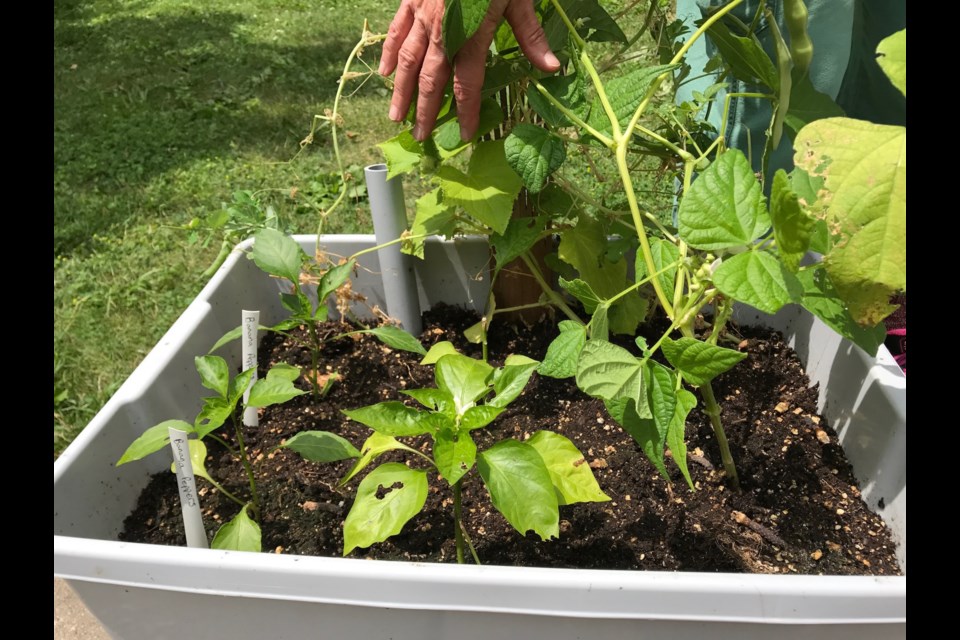A new pilot project run by The Julien Project will bring the food cycle closer to classrooms and community groups as they promote the health benefits and ease of growing fresh, nutritious vegetables in limited spaces with the Living Food Box program.
The Julien Project recently received funding from The Elevator Project to purchase and distribute 18 food boxes, and corresponding planting workshops, targeted to mental health participants from HOPE House and Homewood’s Community Mental Health Outreach Program, as well as four elementary and high school classrooms.
“The Living Food Box program allows for community members to [access] fresh, organic and healthy foods straight from a box on their patio or balcony,” said Anna Kroetsh, horticultural therapist and project manager at The Julien Project. “By putting a little time and effort into planting the seeds, participants get to watch their invested efforts quickly grow. [They] enjoy the excitement of serving the food and learning how it grows.”
In total, the project will directly benefit 90 participants who will gain transferable knowledge and skills, which, in turn, will be passed along to benefit countless others.
It’s a step that The Julien Project hopes to expand on in order to bridge the gap amongst the marginalized groups they regularly work with (mental health patients, at-risk youth and seniors) who can’t typically afford fresh vegetables or who lack the knowledge and space to grow their own.
“An increasing number of people lack the ability to grow their own food. The problem is particularly serious with marginalized populations in urban areas,” noted Sharon Stewart, founder of The Julien Project.
In the 11 years that her organization has been offering therapeutic gardening services, Stuart said she’s observed many participants lack healthy diets and physically-active lifestyles. A major barrier to healthy living is the high cost of fresh food; having the know-how and space to grow food is often out of reach, she said.
Additionally, many children and youth, along with their parents, lack awareness of food sources and production, something that is contributing to health issues including the “obesity epidemic,” dental problems and early onset diabetes, Stewart said.
The importance of connecting children to their food cycle when they are young is key in order to impart a lasting, positive impression, Kroetsch added. “Their biggest marvel is when they see the food grow from a seed that they planted.”
The Living Food Box’s unique design removes barriers that many find overwhelming when it comes to maintaining a garden. First, it’s portable, making it ideal for small spaces such as a balcony or porch; low-maintenance, due to a built-in, self-watering irrigation feature; and reusable – durable to last through several growing seasons.
Each participating group will receive three boxes to plant with their choice of seasonal seeds, seedlings and herbs, under the guidance of Julien Project horticultural therapists. Planting advice and care will also be covered, and staff will keep the planted boxes for two weeks to nurture young seedlings and ensure a successful start. A second, follow-up workshop will be held to trouble-shoot any issues and share advice on starting up next season’s plantings.
The program is a creative teaching tool that opens up other opportunities, noted Stewart, adding that the fresh produce can be used to augment lunch and snack programs in schools and incorporated into curriculum, such as building support lattices in woodworking shop.
“[The Living Food Box program] is far-reaching, stimulates interest and it’s manageable,” said Stewart.
“It’s something we’d like to expand on with future funding.”
The Julien Project is a registered, charitable organization offering therapeutic gardening programs since 2006. The group recently received a Magic Mayor’s Award in recognition of their work and for providing meaningful volunteer opportunities within the community
The Living Food Box program is available to the public for $95. For more information, or to request availability for your school or group, visit thejulienproject.org.
